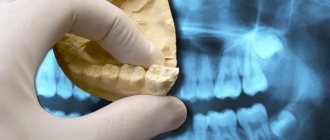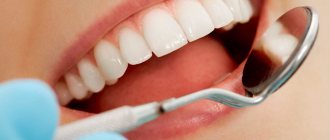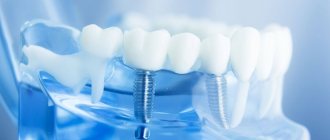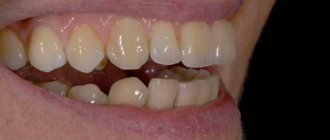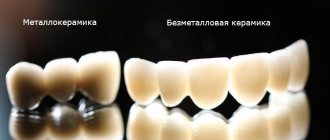The installation of implants in the Implantmaster clinic is performed by the best dental implantologists in Moscow, based on the use of the latest techniques and high-precision modern equipment.
Despite the rapid improvement in the field of implantology, many patients remain dissatisfied with the process of dental restoration. Some note a loss of gum tissue, others note the appearance of cyanosis, and others indicate the development of inflammatory processes near the installed structure.
At the same time, the main reason for aesthetic problems and implant rejection is considered to be the low level of professionalism of the doctor. Today, many specialists are focused on making a profit: they do not think at all about creating the correct aesthetic contour and the durability of the installed implantation system. As a result, instead of rapid osseointegration and ideal smile aesthetics, the patient risks spending a lot of additional money on re-installation of implants.
The Implantmaster clinic employs specialists with an impressive experience of at least 10 years, specializing in the use of modern techniques and premium implantation systems, and regularly improving the level of their professional knowledge in the best clinics in Europe. This ensures the success of dental procedures, increases the ability of dental systems to osseointegrate and significantly reduces the likelihood of dangerous consequences after implantation.
In addition, we provide each patient with a guarantee of free re-treatment in case of implant failure. At the same time, we use modern methods of sedation to minimize any discomfort for the patient during the procedure.
This article contains important information that will enable you to choose an implantologist who can perform any complex procedure to the highest standard.
Get a consultation
We will answer all your questions before visiting the clinic!
+7
Online registration
Content
1 Recommend a good implant dentist in Moscow
2 Rating of the best implantologists in Moscow 2.1 Implant surgeon of the highest category - Bocharov Maxim Viktorovich
2.2 Dentist-implantologist – Dmitry Anatolyevich Chernov
3 It is important to choose the right methodology and make proper planning
4 Make a list of the right questions for the implantologist
5 Decide on a budget for dental implants
6 Key points when communicating with an implant dentist
7 Questions to the implantologist about the need for a sinus lift
8 Diagnosis and treatment plan
9 Clinics that are best avoided
Recommend a good implant dentist in Moscow
In the modern world, it is impossible to overestimate the role of a dentist-implantologist, since he provides an important service - he helps restore the aesthetic and functional characteristics of lost teeth. Before performing prosthetics, a doctor of this specialty conducts a thorough examination of the oral cavity, draws up a treatment plan and installs a dental implant. As for the further fixation of dentures, the use of implants is a priority method of treatment, as it allows you to preserve healthy teeth.
In the absence of several natural units at the end of the row, it is better to give preference to a dentist-implantologist with solid experience and a sufficient theoretical basis that allows him to work with modern techniques and premium dental systems.
The Implantmaster clinic employs doctors who deal with complex clinical situations every day and are ready to install implants even with insufficient bone tissue and in the complete absence of natural teeth in the jaw.
Rating of the best implantologists in Moscow
When considering the rating of Moscow implantologists, it is important to understand that every doctor cannot understand all dental structures at the same time. As a rule, he specializes in one particular implantation system. That is, if you are interested in the best implantologists and their ratings, this point must be taken into account.
Also included in the category “Best dental implantologists in Moscow” are specialists in maxillofacial surgery who have impressive experience in the field of installing dental systems (more than 10 years) and regularly improve the level of their knowledge in this field.
In addition, the rating of Moscow implantologists is influenced by the number and quality of information materials available on the Internet. Unfortunately, many managers of dental clinics do not pay enough attention to promoting information about doctors and their work experience. Moreover, if you are interested in a specific dentist-implantologist, you will not always be able to find reviews about his activities in Moscow. Often such information can be found on the website of the dentistry where the given implantologist works.
The only right decision in this situation would be a detailed study of the real merits of the specialist, and a personal acquaintance with the doctor during a visit to the clinic.
In our dentistry, the initial consultation with an implantologist is free of charge, which allows each patient to draw personal conclusions about his professionalism and approach to treatment.
Our team of doctors
Maxillofacial surgeon, Implantologist
Bocharov Maxim Viktorovich
Experience: 11 years
Dental surgeon, Implantologist
Chernov Dmitry Anatolievich
Experience: 29 years
Orthopedist, Neuromuscular dentist
Stepanov Andrey Vasilievich
Experience: 22 years
Endodontist, Therapist
Skalet Yana Alexandrovna
Experience: 22 years
Orthopedic dentist
Tsoi Sergey Konstantinovich
Experience: 19 years
Dentist-orthodontist
Enikeeva Anna Stanislavovna
Experience: 3 years
Implant surgeon of the highest category – Bocharov Maxim Viktorovich
If you dream of having the best implantologist in Moscow handle your teeth restoration, in our clinic these services are provided at the highest level. We employ competent specialists who specialize in complex clinical situations and are able to carry out high-quality implantation even in the absence of teeth on the jaw.
These include a highly qualified doctor and experienced implant surgeon Bocharov Maxim Viktorovich. With 13 years of experience in the field of implantation, he is one of the professional specialists in the field of fixation of premium Straumann systems. At the same time, as the main method for restoring jaws with a complete lack of teeth, doctors prefer the “All-on-six” and “All-on-four” methods.
In 2006, Dr. Bocharov received his higher education at Kursk State Medical University. Between 2006 and 2010, the doctor completed postgraduate training in implantology and maxillofacial surgery.
In 2012-2013 Implantologist Maxim Bocharov attended courses by Karl Misch in the USA and Thomas Hanzer in Austria on complex methods of implantation and the field of bone tissue reconstruction. After studying new methods of osteoplasty, the doctor paid special attention to surgical methods of restoring teeth with loss of gum tissue. To this end, he received additional education in Switzerland and Germany from renowned world leaders in the field of implantology.
The main principle of Bocharov’s work is the individual choice of the implantation system and the method of its installation in each individual situation.
Read more about Maxim Viktorovich Bocharov »
Dentist-implantologist – Chernov Dmitry Anatolyevich
Highly qualified specialist in the field of maxillofacial surgery and implantology. He has an impressive professional experience of more than 29 years. In 1993 he graduated from the Far Eastern State Medical University with a degree in Dentistry. In 1995, he completed a clinical residency specializing in “Surgical Dentistry”. He has deep knowledge in the field of diagnostics, tooth extraction of any complexity, bone grafting and installation of dental implants.
Read more about Dmitry Anatolyevich Chernov »
It is important to choose the right methodology and make proper planning
There is one important statement that any conscientious implantologist in Moscow will agree with. Its essence is as follows: if, during the period of osseointegration of the implant, its rejection occurs, the main reason for this lies in the low competence of the specialist during planning and surgical intervention.
Exceptions include cases when dental implants are fixed to patients with certain restrictions: persons who use tobacco products; women during menopause; people with high blood sugar levels.
However, it should be remembered that even if implants are fixed in people with high blood pressure, suffering from diseases of the skeletal system or belonging to the elderly age category, then in the case of a competent treatment plan and the correct selection of implantation techniques, the likelihood of peri-implantitis is minimal, similar to healthy people.
Dentistry "Implantmaster" provides a guarantee for a secondary implantation procedure free of charge - in the event of inflammatory processes occurring after the installation of dental structures, during the period of their engraftment.
The main principle is
There is an immutable law in implantology, which any experienced and decent implantologist will agree with. After reading it, you may be surprised that doctors who share this point of view even exist. It says...
- If inflammation around the implant and/or its rejection occurs during the period of implant healing to the bone, i.e. until the load is placed on the implant (prosthetics with a crown) - the reason for this is solely the mistakes or incompetence of the implantologist when planning and performing the operation. An exception to this rule may be situations when the installation of implants is carried out in patients at risk (and patients are warned about these risks), for example - → the risks of installing implants for diabetes, → the risks of smokers, → women during menopause.
But you should also know that even when installing implants in patients at risk (including patients with hypertension, elderly patients, patients with osteoporosis) - with proper planning of the operation and choosing the optimal surgical implantation technique - the risks of an unfavorable outcome of the operation practically do not exceed the same risks during implantation in an absolutely healthy group of patients.
Important: I don’t know whether you will be surprised, but in Moscow, St. Petersburg and in the regions of Russia there are a number of clinics that actually guarantee a free re-implantation operation if the implant is rejected at the stage of its engraftment to the bone. Such clinics are ready to return the money, or, at the patient’s request, to provide alternative prosthetics without the use of implants. This will undoubtedly be a guarantee of the quality of the services provided in the eyes of any patient.
Make a list of the right questions for the implantologist
Before you have an initial consultation with an implantologist, study thematic information on the Internet. Find out in detail what implantation methods exist and which of them are preferable in certain cases. If multiple units are lost, focus on learning about the classic one- and two-step procedures. If there is an absolute lack of teeth, it is advisable to study the features of performing the “All-on-four” and “All-on-six” methods, which are among the instant ones.
Please note that if the implant dentist answers the questions asked without much enthusiasm and is negative about your knowledge, it is better to find another specialist. Such behavior is usually characteristic of unscrupulous or insufficiently competent doctors.
MYTH 4: Implantation takes a long time
Of course, dentistry has not yet learned how to grow new teeth instead of missing ones in one day, and treatment will take some time. As for the procedure itself, it takes less than an hour. From the initial consultation to the installation of the prosthesis, it can take 6-12 months, sometimes more. But this does not mean that you will need to go to the dentist every day all this year. Implantation takes place in several stages, each taking a minimum of time. The longest is the fusion of the implant with the bone (osseointegration). This process lasts about 3-6 months.
Decide on a budget for dental implants
Among the variety of implants on the market, patients are often confused when choosing the right model. This is especially true for situations where only a few dental structures need to be installed. As a rule, doctors in modern clinics try to offer more expensive implant options. However, today many manufacturers from Korea and France offer budget systems that are quite decent in quality.
That is, if you want to undergo a procedure at a cost of up to 50,000 rubles for 1 implant, then try to focus on economy class models. These include Dentium (Korea), Anthogyr (France), etc. The price includes the price of a metal-ceramic crown. In the case of fixing 1 zirconium prosthesis, you will have to pay approximately 60,000 rubles for the turnkey service.
As for such well-known premium implants as Straumann (Switzerland), Nobel (Switzerland) and Astra Tech (Sweden), then get ready to pay about 80-120 thousand rubles for a complex procedure. We offer impressive discounts and promotions on dental systems from well-known manufacturers.
Prices for dental implantation at the Implantmaster clinic »
MYTH 3: Implants often fail
Outdated disc and plate implant models caused many problems for patients due to complex, traumatic fixation into the bone. They did have a high rejection rate (50%). Such models have not been used for a long time, but the stereotypical opinion remains. The latest generation implantation systems are made from biocompatible, hypoallergenic material (medical titanium, zirconium oxide). Thanks to the root-shaped shape of the implant, similar to the anatomy of a natural tooth root, and a special active coating, successful engraftment is ensured in 98-99% of cases.
Key points when communicating with an implant dentist
To understand how competent a dentist is, ask him leading questions; any experienced implant surgeon will be able to give clear, detailed and reasonable answers to them. In addition, it is advisable to have an appointment with 3-5 specialists and compare the information received. This will allow you to draw correct conclusions about the level of professionalism of doctors.
Priority issues include:
- How often do you encounter situations of implant rejection in your patients?
- What do you think is the cause of peri-implantitis?
- In what cases does the implant fail to take root?
- What should I do if a similar situation arises for me?
- Does your dentistry provide any guarantees?
- Are they specified in the contract?
- Do you guarantee a free repeat procedure if the structure is rejected?
If the doctor claims that the rate of osseointegration depends only on the characteristics of your body and that no specialist can guarantee an ideal result, run away from this clinic as soon as possible. And remember that the process of implant healing is completely predictable, and according to statistics, in 99.9% of situations, peri-implantitis is a consequence of the activities of unscrupulous or incompetent specialists.
The Implantmaster clinic provides a guarantee for a free additional implantation procedure in case of rejection of the dental structure at the stage of its osseointegration. In addition, we guarantee that our specialists have high professional skills. That is, by contacting us, you can be sure that qualified Moscow implant dentists with rich practical experience will work with you.
Revelations of an implant surgeon
Dentistry Tags:
Daria Volyanskaya: Good evening, dear friends. The MediaMetrix channel is on air. In the studio Daria Volyanskaya. And your favorite program “Online Reception”. Today we have an enchanting guest - Gaidar Sadraddinov, candidate of medical sciences, dentist, surgeon, implantologist and member of the World Association of Implantologists. Good evening!
Gaidar Sadraddinov: Good evening.
Daria Volyanskaya: Thank you very much for coming to us. Our topic today is stated as “Revelations of an implant surgeon.” Therefore, I immediately have the first provocative question: when will we learn to grow artificial teeth so that we no longer need dentists or implant surgeons and will save money on this?
Gaidar Sadraddinov: How can I answer you so as not to deceive and not give hope. They've been working on this for a very long time. We started, as usual, with rats and dogs, but nothing good came of it. If you believe foreign experts, they learned how to grow all this back in 1980, but there is no evidence of this. We can only believe that someday in our country medicine will reach the level at which we would like to see it. And we will begin to grow teeth ourselves, without the help of doctors.
Daria Volyanskaya: And then dentists will no longer be needed?
Gaidar Sadraddinov: No, I think they will be needed.
Daria Volyanskaya: Always?
Gaidar Sadraddinov: To place the germ directly there, in the place of the missing tooth.
Daria Volyanskaya: Good question: why did you decide to become a doctor? I always ask all the doctors who come to us. And why such a specialization, which usually causes horror and awe among people?
Gaidar Sadraddinov: They are afraid of us for exactly 5 minutes, until they talk to us and understand that we do not have a scalpel or knife in our bosom, and we are quite very cheerful people. Why medicine? Let's start with the fact that my mother is a doctor, although not a dentist, she is my general practitioner. Probably, from her very childhood, I have seen regular books and medical reference books based on her example. I read some myself, and listened to her while she defended her dissertation. This was probably some kind of impetus. Why dentistry? Because I'm a little lazy. And for me, general practice means studying for 6 years, and then for a very long time becoming the specialist you want to become. We chose dentistry by exclusion. Why implantology? Because this is a male specialty, no offense to my therapist friends. A male therapist is too soft and gentle.
Daria Volyanskaya: Is an implantologist tough?
Gaidar Sadraddinov: This is tough, these are hairy arms...
Daria Volyanskaya: And I immediately see the drill.
Gaidar Sadraddinov: No, we don’t use a drill.
Daria Volyanskaya: You have a very interesting specialty with its own specifics, which also requires you to be a very good psychologist, in my opinion. Because when a person comes to you, the patient is not for the most pleasant business or reason, you have to somehow win him over, find some words. How do you reassure patients and what do you tell them?
Gaidar Sadraddinov: Now I will reveal all my secrets.
Daria Volyanskaya: Let's simulate: a person comes into your operating room, is shaking, and understands what they are about to do to him. Here are some secrets to somehow calm you down?
Gaidar Sadraddinov: Here we must be good psychologists. And literally from the first steps of this patient towards the chair, it is already clear whether to speak to him softly or to apply a little pressure. 90% of men, I have the right to say, are more cowardly than women.
Daria Volyanskaya: You have now confirmed my guesses.
Gaidar Sadraddinov: A healthy two-meter man comes, shaking, the chair is wet with fear. The small, fragile girl endures any surgical intervention much calmer. But this is physiology, you are still stronger than us, I admit, this is so. Therefore, the approach is individual. With some you have to lisp, with others, on the contrary, you have to be harsher. And, as practice shows, this always works.
Daria Volyanskaya: Who comes forward with the problem more often – men or women? What statistics are there? Who is taking more active care of themselves now?
Gaidar Sadraddinov: Women. It is women, not girls, because our youth now pays very little attention to health. And, according to statistics, if a young girl under 26-27 years old comes to me, then the picture in her mouth is much more critical than that of a young woman under 40. For some reason, men are used to neglecting their teeth. They think that a man should probably have no teeth. And they come when the picture is very terrible. Basically, these are total works - removing everything and restoring everything. That’s why girls appear at my appointments more often than men.
Daria Volyanskaya: How does dental implantation differ from traditional prosthetics? So I come to you for an appointment, I want to get implants for myself. I don’t know anything about this, I’m afraid, I’m shaking, and now you tell me...
Gaidar Sadraddinov: If we look at a simple example, you have one tooth missing. There is a tooth - one, and there is a tooth - two, there is nothing between them. If we are talking about a non-surgical solution to the problem, then in order to restore the dentition, two adjacent teeth will need to be depulped, killing the nerves there. The teeth will need to be sharpened and three crowns made.
Daria Volyanskaya: In what cases can a person not do without dental implants?
Gaidar Sadraddinov: In the event that a person has gray matter. Everything is very simple.
Daria Volyanskaya: This is the best answer on the air of our program. And from the testimony? Do they come to you when it is already necessary?
Gaidar Sadraddinov: They come to me with everything. I am reliable, like a Kalashnikov assault rifle. These are the unsuccessful attempts of other doctors or very cowardly patients who waited and waited - and then they came, and, of course, recommendations. I really love it when people come to me for recommendations. This flatters me as a doctor.
Daria Volyanskaya: What is a dental implant?
Gaidar Sadraddinov: This is an alternative to your tooth. Today, the most accurate alternative, because nothing better has yet been invented. Helps restore the most important thing - chewing function.
Daria Volyanskaya: How long does it take to install an implant?
Gaidar Sadraddinov: If it’s just an operation, installing one implant today takes about 10 minutes. It’s not difficult.
Daria Volyanskaya: How does this all happen? Tell them in detail to people who maybe want to do this, are afraid and don’t know, don’t have information?
Gaidar Sadraddinov: Any person in his life has encountered such a procedure as installing a filling when a tooth is drilled. The sensations are exactly the same.
Daria Volyanskaya: I just shuddered.
Gaidar Sadraddinov: No need to tremble. A small tunnel is drilled into the bone into which the implant is screwed. The implant is twisted into the bone, and not into the gum, as many for some reason think, and is located in this bone. An implant is an analogue of a tooth root. The implant takes root in the bone for 2, sometimes 3 months. Everything is according to the doctor’s testimony, how long he wants to extend the rehabilitation period. Next comes the orthopedist, who deals directly with prosthetics.
The implant is twisted into the bone, and not into the gum, as many for some reason think, and is located in this bone. An implant is an analogue of a tooth root .
Daria Volyanskaya: How long do you need to wear this implant before installing a temporary crown?
Gaidar Sadraddinov: We spend 2-3 months with the implant while it takes root, and 2-3 weeks to make the crown if it is a single crown.
Daria Volyanskaya: How traumatic is this? And what painkillers do you use for this? I hope this is general anesthesia?
Gaidar Sadraddinov: No, of course. For what?
Daria Volyanskaya: It was a joke.
Gaidar Sadraddinov: There are cases of such anesthesia. To talk about the traumatic nature of tooth extraction, this in itself is a traumatic procedure. There are no atraumatic removals.
Daria Volyanskaya: Is it very painful?
Gaidar Sadraddinov: It doesn’t hurt at all, because today we have a very modern range of painkillers. And this one ampoule, one injection is enough to carry out not minimal, but good surgical intervention. In terms of pain, this is all completely painless.
Daria Volyanskaya: This is while the anesthesia is working. And then you open your eyes and want to die.
Gaidar Sadraddinov: Then the painkiller takes effect.
Daria Volyanskaya: What sets are there?
Gaidar Sadraddinov: I like to prescribe Nimesil to everyone. This is not an advertisement, it is a very good drug, a non-steroidal anti-inflammatory, plus it has a very good analgesic effect. Two appointments are enough for the patient to feel quite good even after a very traumatic intervention.
Daria Volyanskaya: Is there any serious swelling after this installation? If so, how long does it last?
Gaidar Sadraddinov: There are special decongestants that we inject after surgery. They reduce the swelling that we actually should have gotten by 2-3 times. And we no longer have another head nearby, but a small swollen cheek. According to our protocol, swelling occurs on days 2-3 and then begins to decline.
Daria Volyanskaya: Are there any restrictions or contraindications for installing implants?
Gaidar Sadraddinov: About 15-20 years ago, age was considered an absolute contraindication. Today, age criteria are no longer considered by anyone. I remember a patient born in 1937.
About 15-20 years ago, age was considered an absolute contraindication. Today, age criteria are no longer considered by anyone at all.
Daria Volyanskaya: So there is no age limit? And from the age of 18, probably?
Gaidar Sadraddinov: Still, we need to wait until the age when a person’s bones have formed so that there are no complications. There is a beginning of age, but there is no end. Somatic diseases remain contraindications.
Daria Volyanskaya: If the patient is taking hormonal medications or is pregnant?
Gaidar Sadraddinov : Pregnancy - definitely not. As for hormonal drugs, a consultation with an endocrinologist decides whether implantation can be performed or not.
Daria Volyanskaya: A question that, it seems to me, worries everyone. How expensive and unaffordable is it for the average patient’s wallet? Or is it not so scary? Relatively speaking, what is the ceiling in Moscow?
Gaidar Sadraddinov: There is no ceiling in Moscow, because every doctor, every clinic sets the price tag that seems most profitable to them.
Daria Volyanskaya: And what is the bottom one?
Gaidar Sadraddinov: We divide implantation into budget and luxury operations, when the patient’s budget is not limited. But I don’t advise anyone to cross these boundaries. I clearly have patients whom I classify as the budget group, because initially at the time of consultation the patient himself tries to hint to me about his budget. I focus on his budget and offer one or another solution to the problem.
Daria Volyanskaya: There are budget options...
Gaidar Sadraddinov: Yes, of course, so that he can pull off this option. So today nothing is too difficult.
Daria Volyanskaya: Is it true that depending on the lower or upper tooth - different numbers, how long do you walk with an implant?
Gaidar Sadraddinov: I don’t have such clear divisions, but some doctors tend to leave the upper implant to take root for six months, the lower one for 3 months. I focus more on bone type. The bone is dense, and depending on this I set the time frame for the next stage.
Daria Volyanskaya: What techniques are used for implantation? Is there a delayed method, an immediate one, or are these all myths?
Gaidar Sadraddinov: No, these are not myths. It all depends on how experienced the doctor is in various methods. And immediate implantation – I love this kind of work, because you don’t have to wait for some time after tooth extraction.
Daria Volyanskaya: Do you prefer immediate implantation?
Gaidar Sadraddinov: But, again, not always. When the bone volume that we have preserved after tooth extraction allows it. As an implantologist, I need to obtain primary stabilization of the implant in the bone. If I don’t get it, then we will get a 50/50 result - the implant will either take root or not. That’s why I like one-step work, when I removed a tooth, implanted it, and after 3 months the patient is already walking around happy with the tooth. Otherwise, the period is extended by six months.
As for immediate loads, everything is very blurry here too. There are one-stage jobs with one-stage loads. In 90% of cases, this is the front, that is, the front teeth, when a person needs to smile, we do such work.
Daria Volyanskaya: What material are implants made of, what types are on the market? And do they have technological features? Who do you like to work with?
Gaidar Sadraddinov: There is only one technology. And, it seems to me, it is the most win-win. This is titanium, the material from which the implant is made.
Gaidar Sadraddinov: I read that it is made from zirconium. Moreover, it is more expensive than titanium, and that titanium often causes an allergic reaction. Is this a myth or truth?
Gaidar Sadraddinov: In my practice there was one case when we had an unsuccessful implantation, an unsuccessful reinstallation. And then I realized that I needed to go dig deeper. We sent the patient, she turned out to be allergic to titanium, that is, metal intolerance. In such cases, zirconium is the solution. But I am a little conservative, even if all my colleagues swear at me, but I like to work with ordinary implants, without any innovations.
Daria Volyanskaya: Are these implants made domestically? What is the market situation? Is it true that Western samples are superior in quality to domestic ones? Do we have implant production?
Gaidar Sadraddinov: I am a patriot of my country, but, to be honest, I trust foreign manufacturers more.
Daria Volyanskaya: What countries are these? Where is this produced?
Gaidar Sadraddinov: Switzerland, USA. I understand that our relationship is strained, but I trust them. Our implants have recently appeared on the market. Yes, maybe they are good. I know a lot of doctors who work with them.
Daria Volyanskaya: But you don’t work with them?
Gaidar Sadraddinov: I don't work. It’s probably easier for me this way, because I work with brands that have been on the market for more than 30 and 50 years, and I trust them, therefore, I see the results that I get.
Daria Volyanskaya: What is the service life of the implant? You give yourself all this pleasure, you give a lot of money. And how long will this last?
Gaidar Sadraddinov: Everything is individual here. I recently came across Chinese implants. The implant lasted for a year; he was operated on in Russia. The doctor did not hide the name of the implant; on the Internet one could immediately understand the country of origin. You know, the implant was not made of titanium, it was a coating, because within a year this coating had resolved.
Daria Volyanskaya: It’s good that it’s not made of plastic.
Gaidar Sadraddinov: Yes. The implant failed after a year. What is the qualitative difference between an expensive implant and a cheap one? The same titanium is a biomaterial that simply does not reject. And therefore, the service life of this implant depends more on individual factors: the age, health of the patient and the direct functional affiliation of a particular implant.
Daria Volyanskaya: You mentioned implant rejection. Tell me, in what cases does this happen and what to do in such situations?
Gaidar Sadraddinov: A young and healthy 25-year-old guy may come and his implantation was unsuccessful, the implant was rejected. Here you need to understand at what stage this all happened, where the mistake was made, and who made it. Because there may be dishonest behavior of the patient. After the operation, we have a rehabilitation period, like any doctor, who strongly recommends that the patient refrain from any procedures for a certain time. If the patient is not conscientious about these instructions, then we can get a picture that our implant has not taken root.
Daria Volyanskaya: What should you do in this case when it doesn’t take root?
Gaidar Sadraddinov: The most correct decision would be to get such an implant.
Daria Volyanskaya: Is this another operation?
Gaidar Sadraddinov: Yes. If the implant has no longer taken root, the patient understands this immediately, because the place where the implant is installed can be very swollen, it hurts, some discharge may appear from this area, and the temperature may rise. And patients who usually look into their mouth every day after implantation, they wonder what will happen there, whether the tooth will grow, they understand that something has gone wrong. Consequently, they contact their doctor. If the doctor is conscientious, he picks up the phone and invites them to a visit.
Daria Volyanskaya: The main thing here is not to hesitate?
Gaidar Sadraddinov: Yes, because every day this discharge, which we constantly have in our mouths, takes place. We're losing bone.
Daria Volyanskaya: They call and come to you. And what will happen next?
Gaidar Sadraddinov: They come, we get this implant.
Daria Volyanskaya: Anesthesia again?
Gaidar Sadraddinov: Local anesthesia. The procedure is similar to tooth extraction because the implant is often unstable in the bone. We take it out, clean it, stitch it in. Re-implantation will depend on how quickly the bone volume is restored. We received a bone, we take a dynamic picture after 2-3 months, we see that we can work with this patient, we do the work, provide prosthetics, and release the satisfied person into the wild.
Daria Volyanskaya: After an initial consultation with a doctor, how long does the patient need to proceed directly to the operation? And what tests should I take? How does the preparation process work?
Gaidar Sadraddinov : The initial consultation with us is necessarily pictures, CT - computed tomography, where we can fully see the whole picture of the bone, direct examination in a chair to assess the degree, look at the mucous membrane.
Daria Volyanskaya: Just a disaster, right?
Gaidar Sadraddinov: Catastrophe. Next, the patient is given a list of tests that he needs to have on hand. A treatment plan and amounts are drawn up depending on the patient’s budget. Next, we release the patient for an indefinite period while he prepares all the tests, which he either mails or directly brings to the clinic himself. We carry out an analysis and identify all the pros and cons. Next, if everything is fine and there are no acute contraindications, we prescribe the patient for surgery. There are also recommendations before the operation.
Daria Volyanskaya: What can’t be done, what can you do?
Gaidar Sadraddinov: In principle, anything is possible, just the main thing is to eat and come to us. After the operation there are a little more restrictions.
Daria Volyanskaya: Stop in more detail here. Haven't eaten for a week?
Gaidar Sadraddinov: No. A lot of people don’t eat, especially girls. They say that “we’ll just lose weight.” You need to eat, your diet needs to change. Avoid rough food.
Daria Volyanskaya: Like cosmonauts - pureed, pureed...
Gaidar Sadraddinov: Yes. Then they say “thank you” to me, because all those acute moments that bothered them go away.
Daria Volyanskaya: Everything is returning to normal.
Gaidar Sadraddinov: I ask you to change the nature of your diet, limit physical activity, in some cases we limit flights, because after certain procedures it is undesirable for the patient to fly on airplanes, and, of course, not to take a steam bath.
Daria Volyanskaya: So, no baths or saunas?
Gaidar Sadraddinov: Yes.
Daria Volyanskaya: How long will these restrictions last?
Gaidar Sadraddinov: 3 weeks. And physical activity, because I have a lot of hockey players, you know, they have problems - lack of teeth. For some reason they come to me for surgery and say: “We’ll be done by six? I have practice at seven.”
There are restrictions, but large-scale ones, that you just need to lie down and not move - this is nonsense. You need to continue to lead an active lifestyle, but not going beyond what is permitted.
Daria Volyanskaya: Are there any recommendations on how to properly care for implants in order to extend their service life?
Gaidar Sadraddinov: We give recommendations to all patients. Hygiene, even if there is nothing foreign in your mouth, you must follow simple hygiene rules. It will probably not be news to anyone that some people are naturally lucky with their teeth, while others are not. A person can brush his teeth, use a bunch of hygiene products, and still he is a regular at the dentist. A person who simply brushes his teeth twice a day, at the same time eats a lot of sweets, and everything is fine with him. Care is very simple. I always strongly recommend that all patients use an irrigator when we have already fitted them with prosthetics.
Daria Volyanskaya: And what is this?
Gaidar Sadraddinov: Patients go for cleaning. An irrigator is a home appliance that replaces this cleaning.
Daria Volyanskaya: Is this cleaning with high-pressure water?
Gaidar Sadraddinov: Yes, this is water under pressure, which washes all the pockets.
Daria Volyanskaya: Can this be bought at the pharmacy?
Gaidar Sadraddinov: In any pharmacy. The pricing policy will suit any person, because the budget is from 3 to 300.
Daria Volyanskaya: And how often do they need to do what?
Gaidar Sadraddinov: In an amicable way, for the night.
Daria Volyanskaya: Before bed.
Gaidar Sadraddinov: Before bed. Brush your teeth, shoot, and that's it.
Daria Volyanskaya: Oral hygiene. And special pastes, brushes, rinses...
Gaidar Sadraddinov: It seems to me that in our time, with such a spectrum of everything, a person can simply choose any paste for himself by reading the notes and annotations.
Daria Volyanskaya: Maybe there are special medical ones that are only available with a doctor’s prescription?
Gaidar Sadraddinov: No, there is no such thing, ordinary pastes. Those who want whiter teeth use whitening products, those who want to soothe their gums use all sorts of chamomile extracts. Everything is optional.
Daria Volyanskaya: Plus painkillers. Does medication support occur in parallel? Do I need to take anything?
Gaidar Sadraddinov: After the operation, we take antibiotics, because we have a foreign body. And so that our body behaves correctly, adequately, we prescribe antibiotics. Antibiotics are prescribed directly taking into account the body's sensitivity to a given antibiotic, so as not to get into bad situations with allergies. Next, this is an anesthetic, rinsing with solutions - chlorhexidine, etc. And just care and hygiene. Taking hygiene to a new level.
Daria Volyanskaya: Can people with type 1 or type 2 diabetes have an implant?
Gaidar Sadraddinov: I always refer all patients with diabetes, any disorders or blood diseases to specialized specialists.
Daria Volyanskaya: Do you have such practice in general?
Gaidar Sadraddinov: There is practice.
Daria Volyanskaya: All is not lost. If a person has diabetes, can he get an implant?
Gaidar Sadraddinov: The patient was implanted after a course of chemotherapy. Although some doctors refused her, I suggested it to her and said: “Let’s try.” Still, there are no direct contraindications. Everything is fine with her health and with our work. As for blood diseases, if a specialized specialist gives the go-ahead, then we work with such patients.
Daria Volyanskaya: Dentistry and implantology are a fairly high-tech branch of medicine and direction. And in recent years, everything has stepped forward for us. You, as a person who is directly involved in this, tell us what is new, advanced, promising, innovative in your field?
Gaidar Sadraddinov: A very promising industry. Every day is a new discovery in the field of medicine. And not only are they receiving implants, they are already coming up with a completely new line of implants with a completely nano-coating.
They are already coming up with a completely new line of nano-coated implants
Daria Volyanskaya: Diamond-coated.
Gaidar Sadraddinov: It hasn’t come to that yet. This is a very fast-moving industry, so it would be stupid to talk about any innovative methods, because today it may already be outdated. Tomorrow something new may appear. Therefore, I strongly recommend to all my colleagues to go to all sorts of seminars more often, to attend lectures by our colleagues more often, because some are still afraid, and some are already working.
Daria Volyanskaya: Do you have any operations with robotics yet?
Gaidar Sadraddinov: I think that this is not necessary. These are more strip operations. Our operations are not strip operations, so no one has canceled implant surgeons yet.
Daria Volyanskaya: I already understood from our interview that you definitely think that implant surgeons will always be needed, even with the advanced development of medicine.
Gaidar Sadraddinov: Of course.
Daria Volyanskaya: You come to see an implantologist or surgeon, how do you understand that this is a qualified doctor? How to determine?
Gaidar Sadraddinov: No way.
Daria Volyanskaya: I don't believe in it. Uncover the mystery. Maybe some techniques, additional questions?
Gaidar Sadraddinov: My advice to all patients who are thinking about choosing a doctor is not to immediately become attached to one doctor. You need to go to the doctors.
Daria Volyanskaya: Third opinion.
Gaidar Sadraddinov: Third opinion, definitely. Go from one specialist to another for consultations and choose a specialist. You look at the doctor and you like him as a doctor, as a person, and you like his treatment plan.
Daria Volyanskaya: The cost of treatment...
Gaidar Sadraddinov: It’s better not to focus on this.
Daria Volyanskaya: But implantation cannot cost less than some money.
Gaidar Sadraddinov: If implantation costs less than 20 thousand rubles, I would think about it. It's my opinion. Cheaper than this amount is still hack work.
Daria Volyanskaya: What about the doctor’s practice period, that is, the time he practices? Or does this not affect anything?
Gaidar Sadraddinov: Previously, they went to specialists who were over 50 years old. Today I give this banner of victory to young specialists, because when attending any seminars, the lecturer is a doctor under 30 years old. I listen to him and understand that he is a specialized doctor, a practitioner, a theorist. There are no age restrictions. Work experience is needed, without experience in our time you can’t get anywhere. And, of course, the doctor’s specialization. He must know what he's doing.
Daria Volyanskaya: If we turn to international practice, in which country is implantology at the advanced level? And where should young professionals go for internships?
Gaidar Sadraddinov: I strongly recommend everyone to visit the USA at least once in their life. Despite different attitudes, despite patriots who say “never,” I recommend America, not even Germany.
Daria Volyanskaya: Is there some kind of congress being held there?
Gaidar Sadraddinov: Specialists who love to study and travel are always subscribed to tour operators, who send them various dental seminars by email. Therefore, there are no problems with this. There are a lot of Western doctors who come to us to give lectures, but I strongly recommend flying there once. And this experience is unforgettable.
Daria Volyanskaya: In Miami?
Gaidar Sadraddinov: Why not?
Daria Volyanskaya: Unfortunately, our program is coming to an end. Thank you very much for taking the time.
Gaidar Sadraddinov: Thank you!
Daria Volyanskaya: We will be glad to see you again and again. Dear friends, our guest today was Gaidar Sadraddinov, Candidate of Medical Sciences, dentist, implantologist, surgeon. Today we talked about implantology. It was the MediaMetrix channel, the Online Reception program. The broadcast was hosted by Daria Volyanskaya for you. Don’t get sick, don’t self-medicate, go to specialists more often and don’t read all sorts of myths on the Internet. See you again!
Questions to the implantologist about the need for a sinus lift
These questions are directly related to sinus lifting, osteoplasty and the formation of the correct gingival contour. Here are some of them:
- My sister had a situation with a not very favorable outcome. After installing an implant 1.5 years ago, she discovered cyanosis in the area of the gum tissue. Then the gums began to recede. Tell me, do I face a similar complication? And how can it be avoided?
- I have heard that insufficient aesthetics in the area of gingival tissue is manifested against the background of insufficient bone size near the neck of the structure, and due to loss of soft tissue. Am I experiencing a similar situation?
- Which osteoplasty method would you recommend for me?
If the above problems occur to you, be sure to ask your doctor how he plans to solve them. This may require a procedure to transplant part of the gum tissue or graft bone tissue.
Our clinic’s specialists have the skills to perform complex osteoplastic operations, which makes our services universal for most patients.
Read more about sinus lift »
MYTH 1: Getting an implant is painful.
Implantation is the surgical insertion of an implant into the jawbone to replace the missing tooth root. Like any other invasive dental procedure, implantation is performed under anesthesia. Considering that bone tissue has no pain receptors at all, the process of installing and engrafting an artificial root is painless. After the intervention, unpleasant sensations may occur (minor pain, swelling of the gums), but this is a natural reaction of the body, which passes without consequences and is controlled by the usual painkiller.
Diagnosis and treatment plan
Please note that any implant dentist who occupies a significant place in the ranking will definitely perform the following before planning the procedure. Also common today is the use of a three-dimensional modeling method, which gives patients a unique opportunity to see what future dentures in the oral cavity will look like. This suggests that if your specialist is focused on the use of panoramic or targeted images, it is better to consult another doctor.
The same goes for those dentists who do not plan to take an anamnesis of your physical condition. For example, women are not recommended to carry out the procedure of fixing implants not only during menstruation, but a few days before it and a few days after it.
In addition, to choose a competent implantologist, consider his behavior when communicating with patients with contraindications. That is, if you have high blood sugar levels or are registered for hypertension, the doctor should not perform surgery without making sure that the levels stabilize within 1-2 months. In the case of smokers, the doctor must use an individual approach, since the risks of an unfavorable outcome in this case are significantly increased.
You can judge the high level of professionalism of a doctor by the moment when he suggests conducting an analysis of the microflora of the oral cavity. This is a necessary research method before implantation, since it helps prevent the risk of rejection of the structure in the event of detection of pathogenic microflora that occurs against the background of prolonged inflammatory processes in the area and the use of antibiotics.
Read more about computed tomography »
Clinics that are best avoided
In some situations, 7-14 days after implantation, patients may experience inflammatory processes in the oral cavity. However, in some dentistry, such visitors are consulted only a week after their visit. As a rule, such cases are typical for small clinics that do not have a full-time implantologist.
This is fraught with complete rejection of the dental structure and other unpleasant phenomena. That is, try to choose dentistry that has its own implant surgeon on staff. This will allow you to receive assistance on the same day or the next day.
Another important point is the implementation of direct contact between the implantologist and the dental technician, which significantly reduces the production time of dentures and eliminates the presence of errors in finished orthopedic structures.
Author:
MYTH 6: Implants are very expensive
The cost of implantation is more expensive than classical prosthetics, this is a fact. But if you consider in the long term, installing an implant will cost less than a traditional fixed bridge:
- The artificial root is implanted for life; only orthopedic structures are subject to replacement. The average service life of a classic metal-ceramic prosthesis supported by natural teeth is about 5-6 years, and supported by implants - 10-12 years.
- Manufacturers offer implantation systems in different price categories, among which it is easy to choose the optimal option in terms of quality and price.
- When replacing a classic prosthesis, retreatment of supporting units is often required, which increases the cost of reprosthetics.
- Since the main chewing load falls on the supporting teeth, the bone under the prosthesis begins to atrophy, the gums sag, which requires correction of the orthopedic system. This also affects the price.
Based on all of the above, implantation in the long term turns out to be more financially beneficial than traditional prosthetics.
